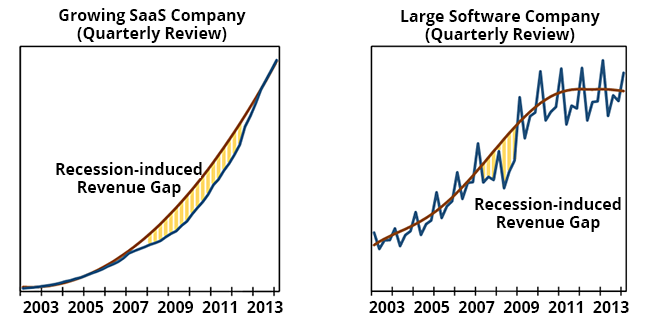In Business as in Politics, “It’s the Economy, Stupid” – But That’s Not All
- The economy and the markets that you address also affect the performance of your company
- The most important factor driving leads, opportunities, sales and revenue is the market
- Some companies perform better than the market – and better than their competitors under all conditions
In his 1992 presidential campaign, Bill Clinton reminded people that a robust economy affects our well-being as a people, our choices as a society and our strength as a world power. It was during this campaign that Clinton’s campaign strategist, James Carville famously coined the catchphrase, “It’s the economy, stupid.”
The economy and the markets that you address also affect the performance of your company. During cyclical downturns and subsequent recoveries, how has your organization performed? What did you do about it? Were you prepared for the inevitable drops and rebounds in leads, opportunities and bookings? Did your marketing, sales and product management processes make a difference?
Over the years, I’ve worked with executives and marketers who believed that the economy did not affect their businesses…until it did. They believed they were the masters of their own destinies…until they weren’t. In fact, changes in economic activity and underlying market conditions affect all businesses.
For example, look at the revenue for a fast-growing software-as-a-service (SaaS) company shown in the chart below. The recession in 2008 and early 2009 significantly slowed revenue growth. Revenue did not decrease in any quarter, and management may have felt that they emerged unscathed from the worst recession since the Great Depression. However, relative to its long-term trend, the company experienced a revenue gap for several years.
Now, look at the revenue for a large enterprise software company (see chart). Revenue actually fell in several quarters on a year-over-year basis during the last recession. This company also experienced a revenue gap relative to its long-term trend for about two years.

I have analyzed sales for many different products and services for many companies in many different industries. In all cases, the most important factor driving leads, opportunities, sales and revenue is the market. If the economy is robust and markets are growing, then customers and prospects have more money to spend. If the economy is stagnant and markets are weak, then belts are tightened, budgets are cut and spending power shrinks. Either customers and prospects have money to spend on your products and services, or they don’t.
However, some companies perform better than the market – and better than their competitors under all conditions. Why? Effective planning, marketing, sales and product management.
A comprehensive analysis of leads, opportunities and/or sales incorporates internal and external factors and quantifies the impacts of the key drivers, including market conditions (specified for major market segments), relative prices (created from product/service prices and broader measures of inflation), technology and competitive trends, innovation, research and development, and marketing activities (such as digital marketing, advertising, events and email).
External factors – the factors you don’t control – are the biggest drivers of sales. They account for a large percentage of total sales. Internal factors – the factors you do control – account for a smaller percentage of total sales, but the percentage varies significantly by company, by industry and over time. Some companies control less than 10 percent of their total sales, while others control close to 30 percent of their total sales. What accounts for the difference? Better, well-executed planning and well-aligned marketing, sales, and product management.
Yes, it’s the economy. It’s the market. So, it is important that you understand how economic conditions and market dynamics affect your business.
Yes, you can control more of your destiny if you plan ahead. So, it is critically important that you improve and align your marketing, sales and product management. If you do, you will perform better in all economic and market conditions, and you will do so at the expense of your competitors. If you don’t, perhaps your competitors will, and you will be wondering what happened to your market share.